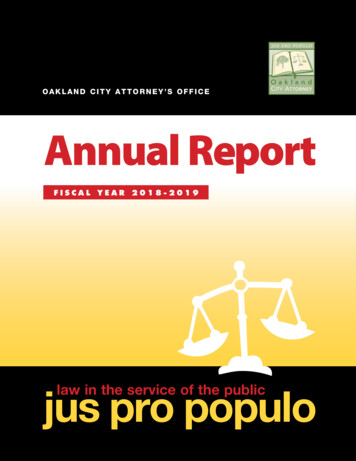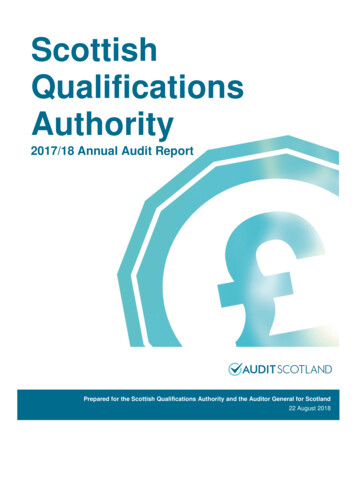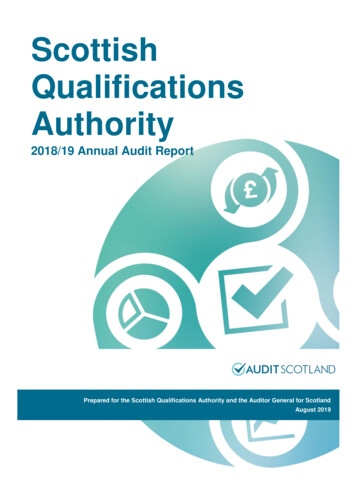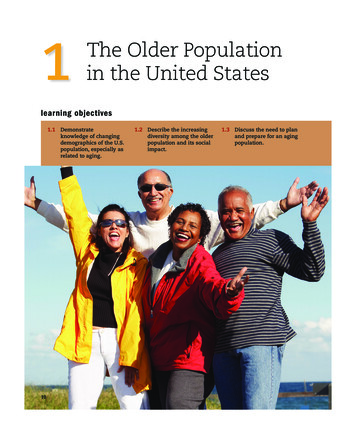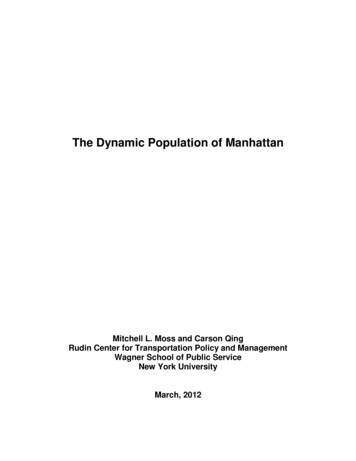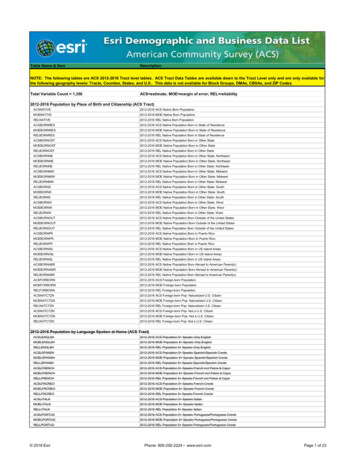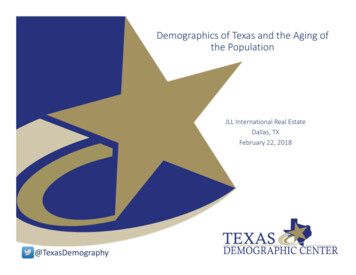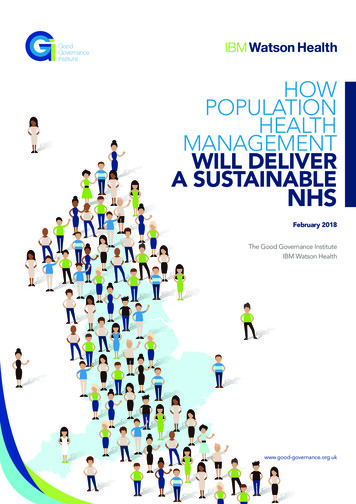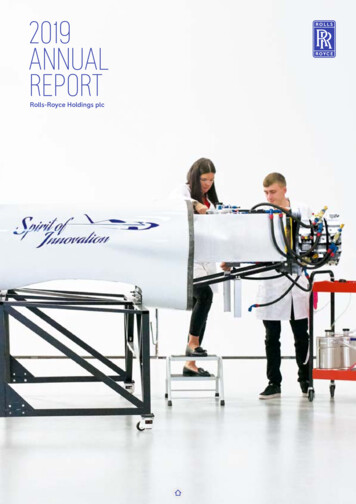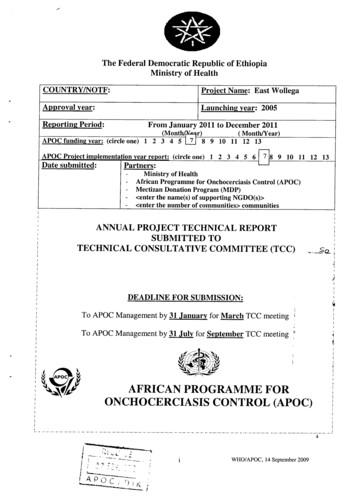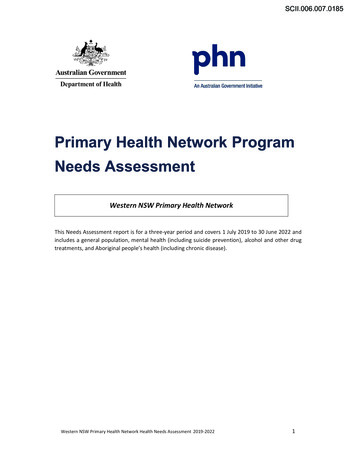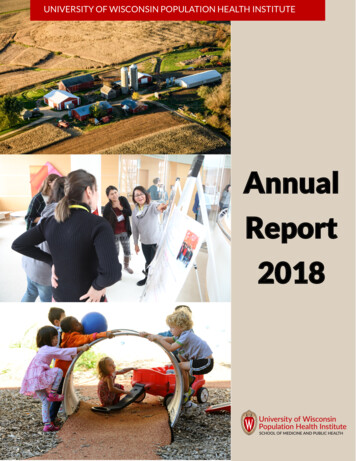
Transcription
UNIVERSITY OF WISCONSIN POPULATION HEALTH INSTITUTEAnnualReport20181
UNIVERSITY OF WISCONSIN POPULATION HEALTH INSTITUTE 2018 ANNUAL REPORTContents3Letter from Dean Golden3Letter from Dr. Sheri Johnson4Mission, Goals, and Values5Community Advisory Board6Executive Committee7Affiliated Faculty Investigators9Institute Programs and Cross-Cutting Themes10 County Health Rakings & Roadmaps11 Evaluation Research12 Health Policy13 Mobilizing Action Toward Community Health16 Education16 Wisconsin Population Health Service Fellowship18 Community Engagement20 Healthy Wisconsin Leadership Institute22 Translating Evidence for Practice22 Evidence-Based Health Policy Project22 What Works for Health23 Evidence-Based Health Policy Project: Briefings & Trainings24 Select Publications, Reports and Seminars25 Select Abstracts and Presentations27 Select Media Feature Interviews28 UW Population Health Institute Staff in 201830 Budget2
UNIVERSITY OF WISCONSIN POPULATION HEALTH INSTITUTE 2018 ANNUAL REPORTDr. Robert N. Golden, MDDr. Sheri JohnsonDeanDirectorSchool of Medicine & Public HealthUW Population Health InstituteDear Colleagues,Dear Colleagues,Improving the health of the people of Wisconsin iscentral to our mission at the University of Wisconsin School of Medicine and Public Health. We arepart of the collective effort to create conditions forpromoting the best possible health for everyone. Itis essential that we work together — health caresystems, state and local governments, employers,non-profit organizations, and academic institutions— to find and implement the most effective programs and policies. Our longstanding investment inthe UW Population Health Institute as a resourcefor communities across Wisconsin and around thenation, is one tangible example of our commitment.I am proud of the 100 staff, faculty affiliates, andstudents who produced, translated, and disseminated high quality data, research, guidance, andtools for policy and practice. Partnerships with localand state government, Tribes, community-basedorganizations, change-makers, funders, andthought leaders strengthened our efforts to improvehealth and advance equity. Yet our work is notdone.In Wisconsin and across the nation, too many children live in poverty, which has lifelong effects onhealth and wellbeing. And children of color bear adisproportionate burden of exposure to unhealthyData indicate that Wisconsin’s health ranking is fall- conditions. Wide gaps in length and quality of lifepersist across places and between groups of peoing. This trend is a call to action. The outstandingple.research, guidance, and tools produced by thePopulation Health Institute are in high demand.This year, we refreshed our values and launched aStill, more collaboration and innovation is neededto address the unsolved social, environmental, and vision. We recognize that every person matters andshould have a fair and just opportunity to reacheconomic challenges linked to health status. I amtheir full potential. We are committed to strengthenconfident that the Population Health Institute willing and expanding the Institute’s capacity to supcontinue to advance knowledge and practice soport diverse efforts across sectors that seek to adthat everyone in Wisconsin has the opportunity todress inequities. The path forward requires that wereach their full potential.acknowledge our strengths, assess our weaknesses, and identify opportunities for organizationalgrowth. We will strive to stay at the leading edge byvaluing collaboration, excellence, innovation, andreach, in service of the people of Wisconsin andthe nation. Forward we go.3
UNIVERSITY OF WISCONSIN POPULATION HEALTH INSTITUTE 2018 ANNUAL REPORTOur Mission:Translating Research for Policy and PracticeThe UW Population Health Institute advances health andwell-being for all by developing and evaluating interventions andpromoting evidence-based approaches to policy and practice atthe local, state, and national levels. The Institute works acrossthe full spectrum of factors that contribute to health.A focal point for health and health care dialogue within theUniversity of Wisconsin-Madison, and a convener ofstakeholders, the Institute promotes an exchange of expertisebetween and among those within the university and those in thepolicy and practice arena.Our Goals: Address a broad range of real-world, health-relatedproblems of topical interest and stakeholder relevance; Promote partnerships between researchers and users ofresearch, encouraging collaboration between theacademic community and those engaged in practice andpolicy within both the public and private sectors; Evaluate programs and policies to support qualityimprovement, promote accountability, and seekevidence-based solutions; Build the knowledge base of effective programs andpolicies; Provide learning opportunities for practitioners andstudents; andContribute to policy decisions and program implementations that improve health and well-being for all. Our Values:Collaboration – Act with integrity, accountability, and respectto build and sustain diverse partnerships that prioritize mutualbenefit and meaningful engagement.Excellence – Aim high, seek feedback, and continually improve.Innovation – Create, test, refine, and promote new ideas andapproaches at the leading edge.Photos by Jeff Miller/UW-MadisonReach – Ensure work is meaningful and accessible.4
UNIVERSITY OF WISCONSIN POPULATION HEALTH INSTITUTE 2018 ANNUAL REPORTCommunity Advisory BoardThe Institute is guided by a Community Advisory Board with members from the health care, publichealth, business, and education sectors, as well as leaders from Wisconsin’s legislature.The Board meets two to three times per year to guide the work of the Institute and providefeedback on its programs and publications.Advisory Board Members in 2018Tim BartholowGregory NyczVP & Chief Medical OfficerWEA TrustDirectorFamily Health Center of Marshfield Inc.Eric BorgerdingLisa Peyton-CairePresident/CEOWisconsin Hospital AssociationPresidentThe Foundation for Black Women’s WellnessCheryl DeMarsChristopher QueramPresident and CEOThe AlliancePresident/CEOWI Collaborative for Healthcare QualityKurt EggebrechtAyaz SamadaniHealth OfficerAppleton City Health DepartmentFamily PhysicianDean/St. Mary Regional Clinic—Beaver DamGreg SimmonsCurt GielowCampus Chief ExecutiveConcordia University-Ann ArborPresident and CEOMetaStar, Inc.Kathy LoppnowTim SizeHealth Occupation Education DirectorWisconsin Technical College SystemExecutive DirectorRural Wisconsin Health CooperativePhoto by Bryce Richter / UW-Madison5
UNIVERSITY OF WISCONSIN POPULATION HEALTH INSTITUTE 2018 ANNUAL REPORTExecutive CommitteeThe Population Health Institute supports the mission of our integrated School of Medicine and PublicHealth to translate public health and health policy research for practice. We consider our work anembodiment of the Wisconsin Idea, working with the public and private sectors — government, business, advocates, and community members — at the state and local level — toward a healthierWisconsin.The Executive Committee provides guidance to the Director on the performance of the Institute,reviewing goals and objectives and evaluating accomplishments through this annual report.Executive Committee Members in 2018Maureen Durkin, PhD, DrPHChair, Population Health SciencesProfessor of Population Health Sciences and PediatricsUW School of Medicine and Public HealthJonathan Jaffery, MDSenior Vice President, Chief Population Health Officer, UW HealthPresident, UW Health ACOTom Oliver, PhD, MHAProfessor, Population Health SciencesUW School of Medicine and Public HealthPatrick Remington, MD, MPHAssociate Dean for Public HealthProfessor, Population Health SciencesUW School of Medicine and Public HealthMaureen A. Smith, MD, MPH, PhDProfessor, Departments of Population Health Sciences and Family Medicine & Community HealthDirector, Health Innovation ProgramDirector, Community-Academic Partnerships Core, UW Institute for Clinical and Translational ResearchUW School of Medicine and Public HealthBarbara (Bobbi) Wolfe, PhDRichard A. Easterlin Professor of Economics, Population Health Sciences, and Public AffairsUW La Follette School of Public AffairsSusan Zahner, DrPH, MPH , FAANAssociate Dean for Faculty AffairsVilas Distinguished Achievement ProfessorUW School of Nursing6
UNIVERSITY OF WISCONSIN POPULATION HEALTH INSTITUTE 2018 ANNUAL REPORTAffiliated Faculty InvestigatorsThese faculty members are affiliated with the UW Population Health Institute through a jointappointment with their home departments. Faculty are designated as "affiliated" when their workextends the teaching and research of our Institute.Richard Brown, MD, MPHJames LaGro, Jr., PhDProfessor, Department of FamilyMedicine & Community HealthDirector of the Wisconsin Initiative toPromote Healthy LifestylesUW School of Medicine and PublicHealthProfessor, Department of Planningand Landscape ArchitectureUW College of Letters & ScienceAffiliation: Obesity Prevention Initiative — Evaluation Research GroupAffiliation: High School SBIRT Project — EvaluationResearch GroupKevin Look, PharmD, PhDAssistant Professor, Social andAdministrative SciencesUW School of PharmacyMarguerite Burns, PhDAssociate Professor, Department ofPopulation Health SciencesUW School of Medicine and PublicHealthAffiliation: Medicaid Research Team—Health Policy GroupAffiliation: Medicaid Research Team —Health Policy GroupKristen Malecki, PhD, MPHLaura Dague, PhDAssistant Professor, Department ofPopulation Health SciencesUW School of Medicine and PublicHealthAssociate ProfessorTexas A&M UniversityAffiliation: Medicaid Research Team —Health Policy GroupAffiliation: Obesity PreventionInitiative, Breast Cancer & TheEnvironment Research Program — EvaluationResearch GroupDeb Ehrenthal, MD, MPH, FACPPaul D. Moberg, PhDAssociate ProfessorLifecourse Initiative for Healthy FamiliesEndowed ChairUW School of Medicine and PublicHealthResearch ProfessorSenior Faculty Advisor, UWPHIEvaluation Research GroupDirector for Evaluation, Institute forClinical & Translational ResearchUW School of Medicine and PublicHealthAffiliations: Lifecourse Initiative forHealthy Families, Obesity PreventionInitiative — Evaluation Research Group; Preceptor,Population Health Service Fellowship — MATCHGroupAffiliation: Evaluation Research GroupDavid Kindig, MD, PhDTom Oliver, PhD, MHAEmeritus Professor, Department ofPopulation Health SciencesEmeritus Vice-Chancellor, HealthSciencesUW School of Medicine andPublic HealthProfessor, Department of PopulationHealth SciencesUW School of Medicine and PublicHealthAffiliation: Principal Investigator,Population Health Service Fellowship– MATCH GroupAffiliation: Principal Investigator, Making Wisconsinthe Healthiest State Project — MATCH Group,Strategic Advisor — CHR&R7
UNIVERSITY OF WISCONSIN POPULATION HEALTH INSTITUTE 2018 ANNUAL REPORTAffiliated Faculty Investigators (cont’d)Patrick Remington, MD, MPHAmy Trentham-Dietz, PhDAssociate Dean for Public HealthProfessor, Department of PopulationHealth SciencesUW School of Medicine and Public HealthProfessor, Department of PopulationHealth SciencesProgram Leader, Cancer Control Program, Carbone Cancer CenterUW School of Medicine and PublicHealthAffiliation: Obesity Prevention Initiative —Evaluation Research Group; PrincipalInvestigator, Population Health Service Fellowship —MATCH Group, Chair — CHR&RAffiliation: Breast Cancer & the EnvironmentResearch Program — Evaluation Research GroupJoel Rogers, PhD, JDJim Vergeront, MDSewell-Bascom Professor of Law, Political Science, Public Affairs, and SociologyDirector, Center on Wisconsin StrategyProgram Director, Wisconsin AIDS/HIVProgramWisconsin Department of HealthServicesAdjunct ProfessorUW School of Medicine and PublicHealthAffiliation: Legacy Communities Alliancefor Health — Evaluation Research Group,MATCH GroupBrendan Saloner, PhDAffiliation: Preceptor & Faculty Member, PopulationHealth Service Fellowship — MATCH GroupAssistant ProfessorJohns Hopkins UniversityDavid Weimer, PhDAffiliation: Medicaid Research team—Health Policy GroupEdwin E Witte Professor of PoliticalEconomyUW La Follette School of Public AffairsAffiliation: Recovery High SchoolsEvaluation — Evaluation ResearchGroup; Health Policy GroupMaureen Smith, MD, MPH, PhDProfessor, Departments of PopulationHealth Sciences and Family MedicineUW School of Medicine and Public HealthBobbi Wolfe, PhDAffiliation: Wisconsin Health Atlas —Evaluation Research GroupRichard A. Easterlin Professor ofEconomics, Population Health Sciences,and Public AffairsUW La Follette School of Public AffairsGeof Swain, MD, MPHAffiliation: Health Policy GroupMedical Director and Chief MedicalOfficer, Milwaukee Health DepartmentAssociate Professor, Department ofFamily Medicine and Community HealthUW School of Medicine and Public HealthAffiliation: Population Health ServiceFellowship – MATCH Group8
UNIVERSITY OF WISCONSIN POPULATION HEALTH INSTITUTE 2018 ANNUAL REPORTInstitute Programs and Cross-Cutting ThemesThe Institute is led by leaders of national stature in applied public health and health policy research.Our progress during 2018 could not have been achieved without the ongoing contributions frommembers of our Community Advisory Board and support from the University of Wisconsin School ofMedicine and Public Health and the Wisconsin Partnership Program.The Programs of the InstituteCounty Health Rankings & Roadmaps (a collaboration with the Robert Wood Johnson Foundation): Analyzes and disseminates trends in population health; supports communities across the nationthat are engaged in health improvement with data, evidence, tools, and guidance; identifies communities who are at the forefront of population health improvement; and networks communities and organizations leading population health efforts.Evaluation Research: Conducts evaluation of a diverse range of public health and human serviceprogramming, including substance abuse prevention and treatment, maternal and child health, schoolhealth promotion, behavioral health in criminal justice populations, treatment courts, mental health,and chronic disease.Health Policy: Engages in research, consulting, policy analyses and evaluation in partnership withWisconsin’s leading public and private sector policymakers in health and health care, addressingquestions of access, coverage, cost, financing, health system performance, disparities, and the socialdeterminants of health. In short: What works? Who pays? Who benefits? Is the benefit worth the cost?Mobilizing Action Toward Community Health (MATCH): Collaborates with partners to evolve practice, focus priorities, and shift power to support collective action on root causes of health and equity.MATCH does this through three Health Equity Hubs: (1) Training, which provides capacity building andtechnical assistance; (2) Engaged Research & Development, which supports data-to-action and develops scholarship, frameworks and tools for change; and (3) Alignment, which convenes and grows alliances for shared action.Cross-Cutting ThemesEducation: Serves as a population health “laboratory” for professional development, where graduatestudents and fellows apply their skills to real-world issues and settings.Community Engagement: Fosters strong partnerships between the University of Wisconsin andpopulation health practitioners and policymakers.Translating Evidence for Practice: Produces, evaluates, and disseminates research to support“what works” in policy and practice.9
UNIVERSITY OF WISCONSIN POPULATION HEALTH INSTITUTE 2018 ANNUAL REPORTCounty Health Rankings & RoadmapsJulie Willems Van DijkProgram Director andSenior Scientist Description: The CountyHealth Rankings & Roadmapsgroup works in collaborationwith the Robert Wood Johnson Foundation (RWJF) to providedata, evidence, guidance, and examples to communities throughout the nation who are committedto improving their health. Through the productionand dissemination of our products, we focus thenation’s attention on the many factors that influence health, thus shifting mindsets about what and who produces health. The result of mindset shiftsis that community members recognize the need foraction and often join together to implement evi dence-informed policies and programs to advancehealth. Our ultimate goal is to improve health outcomes and increase health equity in local communities across the nation. Primary PartnersDiverse organizations and individuals at the national, state, regional, and local levels from nonprofit, academic, governmental, business, community development, philanthropic, health care, andpublic health sectors working to improve the healthof local communities across the nation.Major Program Components County Health RankingsWhat Works for Health (see page 22)Action Center and Community GuidanceRWJF Culture of Health PrizeNational Partnerships & NetworkingHighlights in 2018 Released the 2018 County Health Rankings,accompanied by a Key Findings Report and 50state reports that addressed the intersection ofrace, place, and health with a focus on: lowbirthweight infants; bridging the social and economic divide through an exploration of differences in education and unemployment by raceand place; differential health outcomes in residentially segregated communities; and10investing in children and youth through an exploration of child poverty and teen births.Launched a peer-to-peer virtual learning seriesand post-webinar discussion groups to offeropportunities for communities to connect withand seek guidance from others around thecountry on ways to improve health.Completed a five-year retrospective review ofevidence-informed strategies used by 35 Prize-winning communities to advance healththrough a focus on two of the six Prize criteria:defining health broadly and committing to sustainable systems changes and policy-orientedsolutions.Presented the County Health Rankings dataand tools for action at 60 national, state, andlocal meetings.Hosted a thought-partner retreat with morethan 30 participants representing national andstate organizations focused on data, evidence,and technical assistance to discuss our emerging work related to health equity.Developed a comprehensive proposal for thenext two-year County Health Rankings &Roadmaps grant: Shifting mindsets and catalyzing action on health and equity in communities through the County Health Rankings &Roadmaps and Culture of Health Prize. RWJFawarded the UW Population Health Institute 14,681,381 in funding for 2018-2020.
UNIVERSITY OF WISCONSIN POPULATION HEALTH INSTITUTE 2018 ANNUAL REPORTEvaluation ResearchSara LindbergProgram Director & Assistant Professor (CHS)Description: The Evaluation Research Group at the UW Population Health Instituteis a team of 30 professional evaluators and 10-20 student trainees. Our evaluatorscan advise on and implement a broad range of applied research methods, fromqualitative and descriptive techniques to complex experimental and quasiexperimental trials. We also engage in rigorous intervention research design andevaluation.Primary Partners: We partner with community, tribal, county, and state governmental agencies todevelop, implement, and evaluate local and state programs in public health and human services. Wealso collaborate with national researchers, practitioners, and faculty and staff within the University ofWisconsin on evaluation research projects.The Program Evaluation group was involved in more than 30 actively-funded projects during 2018.Our portfolio of evaluation projects reflects the full range of systems and health factors that contributeto population health and well-being.Examples of the Services Provided Designing and implementing comprehensive program evaluationsDeveloping a wide range of evaluation designs and needs assessmentsDeveloping data collection methods, such as survey instruments and interview protocolsMeasuring progress toward program objectives and national performance standardsConducting qualitative research, including content analysis, intensive interviews, focus groups,and site visitsStatistical analysis of data from surveys, administrative data, and program-specific data setsEvaluation Research Featured ProgramThe Wisconsin Health Atlas is an online data portal that connects public health professionals andcommunity groups working to improve health tothe statewide and local data they need to informand evaluate their work. Our current focus is onproviding obesity prevalence estimates at the ZIPCode level and measures of local policies thatshape the places where the people of Wisconsinlive, work, learn, and play. Beyond data, we provide information on best practices and policy improvement resources to support local healthchampions as they work to make changes in theirareas. In the future, we plan to expand to includeother measures of policies, the environment, andhealth outcomes based on stakeholder input tohelp ensure that our resources support those thatare working to make Wisconsin healthier.11Funding for the Wisconsin Health Atlas is provided by theWisconsin Partnership Program at the UW School ofMedicine and Public Health.
UNIVERSITY OF WISCONSIN POPULATION HEALTH INSTITUTE 2018 ANNUAL REPORTHealth Policy Donna FriedsamProgram DirectorDistinguished Researcher,Population Health Sciences Produced chartpack monitoring ACA enrollmentand changes in BadgerCare enrollment, withinformation about insurance premiums andplans.Provide staff consulting and facilitation undercontract with the Wisconsin Council on MedicalEducation and Workforce and its committees.Description: The Institute’sHealth Policy programs connectthe University to Wisconsin’s leading public and private sector policy- Evidence-Based Health Policy Projectmakers in the health care and public health arenas, Delivered Capitol briefings focusing on:focusing on access, cost, financing, coverage,healthcare workforce, social determinants ofhealth system performance, and disparities. Inhealth: housing, preventing suicide amongshort: What works? Who pays? Who benefits? Andyouth, and young adults.is the benefit worth the cost? Produced a local learning briefing in La Crosse. Convened legislative staff trainings on CountyThe group conducts primary research, evaluatesHealth Rankings & Roadmaps and What Workspolicies and programs, and communicates new andfor Health.existing evidence and analyses through issuebriefs, consultancies, briefings, forums, and sympo- Teaching Applied Health Policysia. Contributed to medical students’ integrated cases on health care costs, insurance, and the poliPrimary Stakeholders: Lawmakers, state officials,cy process.legislative and administrative agency staff, and Mentored two La Follette and two Master ofhealth care provider, purchaser, payer, businessPublic Health graduate students as project asand consumer groups.sistants, and two economics doctoral students. Delivered lectures in UW courses in the nursing,Highlights from 2018physician assistant, medicine, and public healthHealth Financing and System Reformprograms, focusing on Wisconsin health sys Conducted third year of a four-year evaluationtems and financing, Medicaid, and the federalof Wisconsin’s 2014 Medicaid waiver, its impactAffordable Care Act.on health care utilization, costs, and enrollmentby parents, caretaker adults, and childlessPolicy in the Communityadults. Served as a contracted advisor to UW Exten Launched evaluation of the SeniorCare presion on health care access, coverage, and Afscription drug program.fordable Care Act implementation. Awarded Robert Wood Johnson Foundation Continued oversight of Covering Wisconsin, ingrant for new study assessing the value of Medcluding staff offices in Madison and Milwaukee,icaid relative to subsidized Marketplace coversubcontracts serving 23 counties, and leaderage for near-poor adults.ship of seven separate funding sources. Authored briefing paper about Direct Primary Responded to numerous media interviews reCare as it pertains to commercial insurance andgarding Medicaid, Affordable Care Act impleMedicaid, and presented opening testimony tomentation, and related policy, including Wisconthe Legislative Council Study Committee on Disin Public Television, Wisconsin Public Radio,rect Primary Care.Milwaukee Public Radio, Milwaukee Journal Served on the Wisconsin Medicaid agency’sSentinel, Wisconsin State Journal, WISC-TV,Strategic Workgroup to plan for the implementaWisPolitics, and Wisconsin Health News.tion of Wisconsin’s entitlement reforms and ofthe Affordable Care Act.12
UNIVERSITY OF WISCONSIN POPULATION HEALTH INSTITUTE 2018 ANNUAL REPORTMobilizing Action Toward Community Health (MATCH)Paula Tran InzeoMajor ProjectsMATCH Group Director &Associate ResearcherMaking Wisconsin the Healthiest State Measure, assess and report on Wisconsin’shealth and health disparities.Description: Mobilizing ActionToward Community Health (MATCH) Support local community health improvement viatools such as the Wisconsin version of Whatdevelops and deploys programs andWorks for Health and the Assessing and Improvresources and engages in collaboraing Community Health in Wisconsin website,tive partnerships that support stratewhich houses information on shared prioritiesgic community-driven efforts to ensure that all peofrom community health assessments and imple have a fair chance to be healthy in their homes,provement plans from local health departmentsschools, workplaces, and neighborhoods. MATCHand hospitals.aims to change practice, focus priorities, and shift Recognize and encourage local communities’power to support shared action on root causes ofwork through the Wisconsin Healthyhealth and equity. MATCH does this through threeCommunities Designation, a new programHealth Equity Hubs:launched in 2018 in collaboration with diverse Training — builds capacity on critical practices,statewide groups.including health equity, systems and collaboraTheMaking Wisconsin the Healthiest State projecttive leadership lenses, through delivering training, providing technical assistance, and leading is funded by the Wisconsin Partnership Program atthe UW School of Medicine and Public Health.learning and action networks Engaged Research and Development — supports data to action and develops andshares scholarship, frameworks and tools forchange Alignment — convenes and grows alliances forshared actionMATCH resources include tools and supports to: Monitor health and health disparities; Move from data to action by bringing people together to look at the many factors that influencehealth, select strategies that work, and makechanges that will have a lasting impact; Disseminate information to motivate action toward community health improvement; Deliver training programs that build the capacityof and provide service to communities, coalitions, and public health leaders; and Produce seminars, workshops, and lifelonglearning opportunities for community leaders andpublic health practitioners.Primary PartnersDiverse organizations and individuals at the local,state, and national levels from non-profit, academic,governmental, business, and local public health sectors working to improve the health of the state ofWisconsin.13Inaugural Healthy Communities Designees
UNIVERSITY OF WISCONSIN POPULATION HEALTH INSTITUTE 2018 ANNUAL REPORTMobilizing Action Toward Community Health (MATCH) (cont’d)Major Projects (cont’d)Statewide Alignment and Community Training and Technical AssistanceIn response to local capacity-building needs and in order to increase efficiency among organizationsworking with communities, MATCH works with several partners to help align and augment efforts tosupport community-led health improvement initiatives. Examples of this work include: co-hostingmonthly coalition networking calls centered around cross-cutting capacity building skills related tohealth equity and collaborating with partners (including within the UW Population Health Institute) toplan the Making Wisconsin the Healthiest State Convenings, which has a strong community-capacitybuilding component.The Healthiest State Convenings are intended to support shared action to advance health equity andcommunity well-being and to provide opportunities for cross-cutting skill development. Launched in2017, these efforts consist of Agenda Setting meetings in odd years—during which shared prioritiesare identified—and statewide Summits in even years. During the 2017 Agenda Setting Meeting, about80 stakeholders came together and set six shared priorities around health equity in Wisconsin andthroughout 2018, workgroups convened to make progress on these priorities:1. Centering the voices of those most impacted by inequity2. Building diverse alliances3. Advancing a health equity narrative for Wisconsin4. Declaring racism a public health emergency5. Creating a health equity policy agenda6. Cultivating health equity championsIn September 2018, MATCH convened over 250 leaders from around the state in Green Bay for theinaugural Healthiest State Summit. The 2018 Summit featured national keynote speakers, training sessions, spotlights on local communities' work, and action spaces for continued work on the shared priorities.Health Equity Practice InitiativesMATCH supports strategic partnerships and alliances to take shared action on root causes of healthinequities. Partnerships are often comprised of public health, planning, community organizing, academia, philanthropy, and other fields, and are taking shared action in areas such as criminal justice, community development and housing. MATCH also helps bridge efforts in Wisconsin to regional and national partners working to advance health equity.The Thrive WI Statewide Health Equity Alliance (Thrive WI), established in 2012 and staffed byMATCH, serves as a hub for multiple efforts aimed at improving social determinants of health and provides a forum for
Appleton City Health Department Curt Gielow Greg Simmons Campus Chief Executive Concordia University-Ann Arbor . Professor of Population Health Sciences and Pediatrics UW School of Medicine and Public Health Jonathan Jaffery, MD Senior Vice President, Chief Population Health Officer, UW Health
